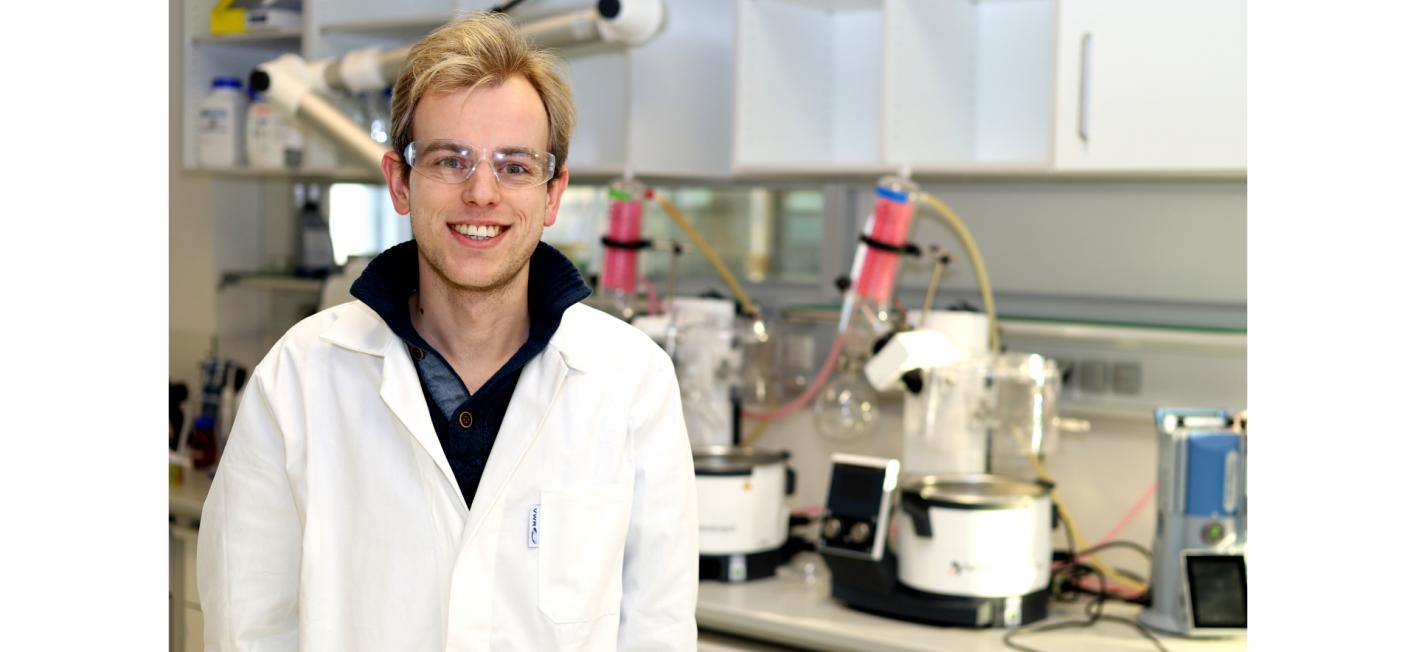Marcus Lantzius-Beninga is a doctoral student in Prof. Dr. Andreas Herrmann's research group at the DWI and was recently awarded the prestigious Friedrich Wilhelm Prize of RWTH Aachen University for his outstanding master's thesis. He also received a doctoral scholarship from the German Academic Scholarship Foundation, which will enable him to realize his project idea and support him for three years

Research for sustainable agriculture
The aim of Lantzius-Beninga's doctoral project, which is funded by the Foundation, is to develop a platform technology that delivers bioactive molecules and substances such as pesticides or signaling molecules to plants more efficiently and in a more targeted manner than conventional systems. The young researcher describes his project as follows: "We are developing a concept that makes the release of active substances for agriculture more sustainable. To do this, we utilize the force that acts during the growth movements of plants."
In a first step, microscopically small polymer structures will be developed that can adhere specifically to different parts of the crop plants. These polymers are bound to the inactivated form of a bioactive molecule. During the growth movement, mechanical force acts on the molecule, which causes the bond to the biomolecule to break at a predetermined breaking point, ultimately releasing and activating the desired bioactive substance. "Our idea has two major advantages: Firstly, we significantly reduce the amount of pesticides and active ingredients that we release into the environment and secondly, the potential of plants to produce valuable compounds on demand could be used in a very targeted way for the first time," explains Lantzius-Beninga. This innovative concept combines interdisciplinary basic research with a high application potential in the fields of agriculture and plant protection.
The planned release system enables the locally targeted and timed release of pesticides, which means that considerably less pesticides are used than with conventional systems, which rely on quantity rather than precision. In a further step of the project, bioactive signaling molecules, such as natural plant stress hormones, will be released to the plant in a targeted manner. These are intended to trigger the production of secondary substances at a specific point in time in order to make the plant more resistant to impending fungal infections and other pathogens. If successful, this could significantly reduce or even eliminate the need for external pesticides.
Interdisciplinarity as the key to success
Marcus Lantzius-Beninga was delighted to receive the grant: "It's a special feeling to receive funding for my own project for the first time. The confirmation from the experts of a good idea motivates me and I see it as the first step towards being able to carry out research independently."
He was particularly inspired by the field of polymer mechanochemistry for this research project. "I got to know and appreciate these approaches during my studies. My research internship supervised by Robert Göstl and Andreas Herrmann inspired me to transfer these concepts to sustainable materials and a new field of application - agriculture." The bigger picture is important to him: "I see it as an opportunity to use my research to contribute to global challenges such as crop protection and sustainable agriculture."
However, the work also brings challenges, especially in an interdisciplinary context. The research project is carried out in cooperation with scientists at the Leibniz Institute of Plant Biochemistry in Halle (Saale). "The biggest challenge in the conceptualization was to understand the mindset and requirements of the plant researchers and to integrate them into my work. This requires a lot of communication and an understanding of the different levels of knowledge and perspectives of the project partners," explains Lantzius-Beninga. However, his project clearly shows how important interdisciplinary cooperation is, especially when basic research and application potential are to go hand in hand.
A glimpse into the future
For Marcus Lantzius-Beninga, it is crucial that his research contributes to solving major global challenges. It is particularly important to him that his work is not only scientifically relevant, but also offers concrete benefits for society. After completing his doctorate, he can imagine initially working as a post-doctoral researcher in another working group in order to gain new perspectives and insights. In the long term, he is aiming for an academic career in which he would like to set up his own research group. Alternatively, he can also see himself working in an innovative, dynamic company.
Doctoral funding from the German Academic Foundation
The German National Academic Foundation's doctoral scholarship provides financial and non-material support to doctoral candidates, assists them in their academic and personal development and creates scope for excellent research. It is linked to networking and qualification opportunities as well as individual support to strengthen the skills of doctoral candidates and promotes social responsibility. Every year, the Foundation awards around 300 doctoral scholarships throughout Germany to doctoral students from all disciplines.
Friedrich Wilhelm Prize
The Friedrich Wilhelm Prize is awarded annually in the form of prize money to students and young scientists at RWTH Aachen University who have been selected for their outstanding achievements in Master's theses and dissertations. Marcus Lantzius-Beninga was awarded this prize by the Rector of RWTH Aachen University, Ulrich Rüdiger, at a ceremony in November 2024.

